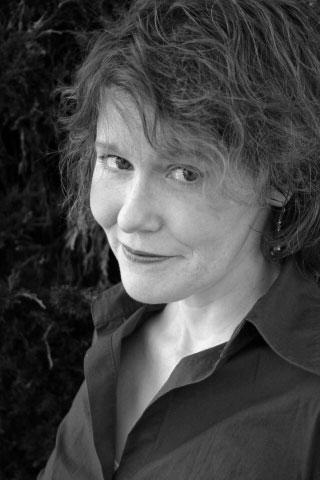
Elizabeth Palmberg is the daughter of one science fiction fan and one Presbyterian elder who is federally licensed to dispense medicinal marijuana (although she would like to point out that he, a glaucoma specialist, only prescribes it in the less than .1% of cases in which it works better than eyedrops). She grew up in St. Louis, MO and Miami, FL, with an older and younger sister, both of whom have waist-length hair.
Her long history of meddling with other people's writing began in her first weeks of college; she escalated from editing the papers of hapless friends to editing (as a tutor) the papers of people she didn't even know. Eventually, she went on to doctoral work in English at Cornell University, where the unsuspecting administration allowed her to teach a first-year writing seminar on "Scary Stories of the Nineteenth Century." While at Cornell, she dwelt in Flapdragon House, whose denizens enticed her into the shadowy underworld that is Lindy Hop. After seven years of "gradual school," she gained three letters to add to her name, and went off to teach for a year each at Kenyon College and Scripps College.
Although Victorian British literature is interesting, it turns out that social justice (particularly relating to economic globalization) is even more interesting. Ways in which people imagine economics kept winding their way into all her courses, including "Love Stories of the Nineteenth Century" and "The Clichés From Space: Gender and Science Fiction." In 2002, the Lord smote her upside of the head and instructed her to go seek a career working for a progressive Christian nonprofit.
She's found a home at Sojourners, first as an intern ("editorial assistant"), and now as an assistant editor. She's enthusiastic about (in descending order) Jesus, Sojourners' switch to monthly publication, and bittersweet chocolate.
Elizabeth Palmberg died peacefully in her sleep at her home in Washington, D.C., on the morning of June 23, 2014. Per her wishes, memorial donations in her name may be made to any of the following: Christ House (1717 Columbia Rd NW, Washington, DC 20009); St. Stephen and the Incarnation Episcopal Church (1525 Newton Street NW, Washington, DC 20010); Sojourners Internship Program (PO Box 70730, Washington, DC 20024-0730) .
Posts By This Author
The Insider List
It's a honking long list of insiders — 605 names long, give or take a few duplicates. What do all of them, mostly from corporate America, know about the secret playbook U.S. trade officials are using next week in San Diego to negotiate a potentially huge international agreement?
Five U.S. senators and 132 members of the House of Representatives wish they knew. They've been asking U.S. Trade Representative Ron Kirk, the official in charge of such negotiations, to pretty-please let all members of Congress see the working text, or at least chapter summaries, of the deceptively benign-sounding Trans-Pacific Partnership, now in the works.
So far, Kirk has said no. (In his defense, last month House Oversight Committee Chairman Darrell Issa, R-Calif., leaked a draft of the "intellectual property" chapter of TPP, just because it's a "secretive agreement" that could “undermine individual privacy rights and stifle innovation." Leaking, whistleblowing--potato, potahto).
Resurrecting Detroit
Angela Glover Blackwell believes in Detroit's future, and she has a vision for how to get there. Failure is not an option.
ECONOMIC DEVELOPMENT advocate Angela Glover Blackwell makes no bones about why PolicyLink, the nonprofit she leads, held its 2,500-person Equity Summit in Detroit last November: “Detroit represented the problem and the hope.”
It’s the problem because it’s “a classic example of what happens when you don’t keep up with the needs of a changing population.” It’s the hope because it’s a hub of fresh energy—from government, foundations, community groups, and business—aiming to “build a future based on the people who are going to be the future.”
When Blackwell talks about that future, she means one founded on the people who live in Detroit now, “not some imaginary people who aren’t here—and not based on trying to attract people who have decided they don’t want to be here.” Over the last half century, fewer and fewer white people have decided to live in Detroit. This trend started in the mid-20th century as more and more people of color did live there, and continued over the last three decades as many people of color also started to move away. In the 2010 census, Detroit registered at just over 700,000 people, down from 1.2 million in 1980. Those that remain face a stark economic situation: 34.5 percent live below the poverty level, Blackwell points out, compared to 15 percent nationally.
For many, Detroit is not just the epitome of the Rust Belt, but of a black-and-white narrative that is so rote as to seem invisible, or invincible: Whites flee an urban area, African Americans in poverty remain (more than 80 percent of Detroit’s 2010 population was African American). But for Blackwell, the story and statistics are never just black and white. She points out that, in Detroit, poverty includes not just 37 percent of African Americans, but also “32.5 percent of Latinos, 33 percent of whites—because so many white people who live in Detroit have been left behind—and 47 percent of Asians; that represents a concentration of the Hmong population.”
TV Bad for Kids' Self-Esteem — Except White Boys
Watching TV is bad for kids' self-esteem, except if they're white boys. (Seems likely that too much TV is bad for everyone's esteem for their fellow humans, made in the image of God ...)
"A new study suggests exposure to today’s electronic media often reduces a child’s self-worth.
Indiana University researchers say this is the case if you are a white girl, a black girl or a black boy.
However, researchers believe the media exposure can help the self-confidence of white boys.
... In the study, the researchers surveyed a group of about 400 black and white preadolescent students in communities in the Midwest over a yearlong period."
Read more here.
Senator Calls Seniors Concerned About Social Security Cuts 'Greedy Geezers'
If there’s a contest for the title “greedy geezer,” a Social Security recipient living on $14K/year probably isn’t in the top ten…
"…former Sen. Alan Simpson recently referred to a group of seniors concerned about cuts to Social Security as “greedy geezers.” While Simpson characterizes retirees who receive an average annual Social Security benefit of $14,000 as “greedy,” a new issue brief from the Center for Economic and Policy Research shows that simply raising or eliminating the Social Security payroll tax cap would only affect a tiny percentage of workers – the wealthiest in our nation -- while strengthening Social Security. …"
"[Currently,] a worker who makes twice the Social Security wage cap – $220,200 per year – pays Social Security tax on only half of his or her earnings, and one who makes just over 1.1 million dollars per year pays the tax on only about a tenth."
Read full report HERE.
Sojourners Recipe for Delicious and Easy Bread
If you want utterly flawless no-knead bread, use the New York Times recipe. But if you want something extremely good and a lot less persnickety to make, try this recipe. It’s extremely popular around the Sojourners offices and, in honor of Sojourners magazine’s May 2012 issue about food justice, from farm to table, we’re bringing it to you!
Hope, Caught on Film
Last week, anonymous U.S. officials told the media that the U.S. military wouldn't stop the drone-launched missile attacks, which they have been carrying out for years within Pakistan.
Discouraging news, indeed. But we all need encouragement, so here's a little good news—images of a chance encounter of a peace-building kind.
Mission Not Accomplished
Whatever President Obama does at the upcoming Summit of the Americas in Cartagena, Colombia this weekend may not be front-page news in the U.S—but for many Colombians trying to make an honest living in their homeland, it could just be Obama's "Mission Accomplished" banner moment.
President George W. Bush's May 2003 speech in front of a giant "Mission Accomplished" sign was, to put it mildly, a premature declaration of triumph in the U.S. war with Iraq, an enterprise that was a bad idea in the first place. In Cartagena this weekend, word is that Obama may declare that, after one year of a promised four-year plan, Colombia has met its commitments to crack down on offenses against Colombian workers' rights and lives.
Soul-Searching for Colombia
It's ripped from the headlines: A young person is killed, but the police seem to be casting aspersions on the victim. It outrages us when it happens in Florida, and it should outrage us just as much when it happens further south.
It was not one person but five who were found murdered on March 15 in the town of San Isidro, Cauca, Colombia. They had been bound hand and foot and shot in the head. As in the case of Trayvon Martin, race was a factor: the victims were ethnically indigenous.
As I saw for myself when I visited Cauca last year, indigenous people in Colombia are (along with other historically marginalized groups) often stuck between a rock and a hard place —attacked or driven from their homes by both guerrilla insurgents and right-wing paramilitaries, both of which want to control territory and each of which accuses neutral parties of supporting the other side.
Mike Daisey’s #Fauxpology and other Media-Survival Hashtags
I’ve been thinking about the media and the truth after listening to This American Life's show this week, which is devoted to thorough and heartfelt repentance for inadvertently broadcasting a story in which monologist Mike Daisey said things that weren’t true. In contrast to the makers of This American Life, Daisey was, shall we say, non-thorough in his apology. And, as we all know, Daisey is just the latest link in a long chain of non-apologizers.
Such a long chain, in fact, that I think it deserves its own Twitter hashtag:
#circumpentance: Giving a vague approximation of repentance while sidestepping the real issue, often by misusing the word “if” or other rhetorical footwork. For example, Daisey’s statement: "the audience of This American Life … if they feel misled or betrayed, I regret to them as well." (Related term, already in use: #fauxpology.)
Once I got started thinking about this, the media-survival hashtags just started bubbling up.
Four Questions for Chris Hoke
The tattooed former meth cook, Zach, is at the heart of the business—the artisan coffee roaster.
Responsible Adults
Clergy to Village Voice: It's not okay to help the sex traffickers.
God's Glory — It's Epic
The approach of Transfiguration Sunday reminds me how, all through my evangelical upbringing, all those Bible passages about God's glory, and especially the parts where God demands glory, made me a bit uneasy. For example, Sunday's reading from 2 Peter 1 doesn't exactly hide anything under a bushel: Jesus “received honor and glory from God the Father when that voice was conveyed to him by the Majestic Glory, saying, 'This is my Son, my Beloved...'"
Divine love? Great. Family relationship? Warm and fuzzy.
But the double helping of glory with honor on the side and majesty on top — doesn’t that come off as, well, a trifle narcissistic?
The root of my misperception was that our culture doesn't have a concept of glory at all. We just have celebrity, which is way, way, different. While giving someone celebrity can get degrading to all concerned (insert your own Jersey Shore joke here), God demanding glory is actually a deeply relational act.
I didn't realize my cultural blind spot from any church sermon or from 10 years of small group Bible studies or from getting my Ph.D. in literature, so thank God that I eventually found myself trying to teach the epic of Gilgamesh. That’s when I realized how central the idea of fame was in many ancient cultures.
Bituminous Coke Dirty-Coal Game Day
I know why those polar bears you're seeing everywhere look so pensive. They're thinking not just about coke (a byproduct of coal used in industry), but more generally about the massive use of dirty coal — used to make nearly half of all U.S. electricity (while renewable sources account for only about a tenth).
They're thinking about how the U.S. and the rest of the world's decades of reckless fossil fuel use keep ratcheting up greenhouse gasses in the atmosphere, causing Arctic ice to melt even faster than expected, and threatening them and all their polar bear friends. They'd like a cold one, all right — a cold Arctic, the way their home should be.
Speaking the Truth in Love: Katharine Hayhoe on Climate Change
There are a lot of heinously unmerited personal attacks going on in these United States right now, but for some reason I’m most bothered by the ones against Dr. Katharine Hayhoe, a climate scientist and evangelical Christian. As this current Sojourners action alert describes, she’s been targeted by Rush Limbaugh, among others, for her efforts to speak the truth about global warming.
Partly, these attacks get under my skin because I’ve always had a soft spot in my heart for evangelical scientists. My dad is one, and my Intervarsity-linked Bible study in grad school was so full of them that, as often the lone humanities student, I jokingly made up a scientific discipline to fit in (“I’m in immunostatistics — I model atypical populations.”)
But mostly, the attacks on Hayhoe sadden me because she’s so genuine and earnest in her desire not just to convey the evidence for climate change, but also to engage in respectful dialogue.
Standing Up to Death Squads
Caught in the crossfire of army, guerrilla, and paramilitary forces, women, farmers, and Indigenous leaders in Colombia fight bravely for the right to live.
Responsible Adults
Editor's Note: In a recent New York Times op-ed, Nicholas Kristof slammed Village Voice Media’s Backpage.com for refusing to shut down its adult services section, which has repeatedly been linked to the sex trafficking of young girls. Check out a sneak preview of Associate Editor Zab Palmberg’s forthcoming piece in the March issue of Sojourners Magazine about the faith community’s response to Backpage:
The Internet makes it easier to sell your old bicycle — but, as a growing interfaith coalition of clergy is emphasizing, it shouldn’t make it easier to sell children for sex.
Two years ago, under pressure from anti-trafficking activists and 17 state attorneys general, Craigslist shut down its “adult services” section. Now, researchers say, the leading online purveyor of “adult” classified ads — which, as numerous criminal cases have shown, include ads pimps use to traffic children they have entrapped — is BackPage.com, owned by Village Voice Media.
Forget The Firm--Meet Francia
Most real-life law students I've met are at way, way less risk of being murdered than their counterparts in a John Grisham novel--except for Francia Marquez. The Afro-Colombian activist and mother of two has received multiple death threats as she advocates to keep her home community from having their ancestral home stolen by a land-grab big mining project.
There's gold in them thar hills in Francia's home, La Toma, in Colombia's Cauca province. Families in her hometown have lived for generations off of small-scale, by-hand gold mining. (Francia herself still puts in some mine time when she visits home, although these days she's spending the most time in her legal studies in Bogota.)
But lots of larger-scale mining concerns want in on the action. Some have sent in bulldozers illegally. Others are joining the land rush of getting mining concessions from the national government--notwithstanding laws on the books that give local communities various rights, including prior consultation on any mining projects.
Two Smart Cookies: Girl Scouts' Wired Campaign Calls Cookie Folk to Clean Up Act

Girl Scout cookies. Photo by Marit & Toomas Hinnosaar via Wylio http://bit.ly/zwXfFU
We're once again in that sugary time of year, Girl Scout cookie season — but, as two Girl Scouts from Ann Arbor, Mich., want you to know, there's palm oil in those cookies, as there is in many foods we eat. And palm oil has been linked not only with rainforest destruction in Indonesia, but with plantations in league with paramilitary killers in Colombia. (Kind of gives appalling new meaning to the phrase “cookie monster.”)
Last year I also met with Colombian farmers driven off their land by paramilitaries, as I write about in this month's issue of Sojourners, so I was excited to interview Madison and Rhiannon after their recent trip to Colombia.
Read on to find out about how, trying to live by the Girl Scout Law, these two intrepid 11th-graders have been on a five-year mission to stop cookies — and lots of other things you may be planning to eat — from, well, palming off human rights abuses on U.S. snack-seekers.
Five Questions for Catherine Rowan
"I think it is a spiritual task to struggle with questions such as what and who we place at the center of our economy"








